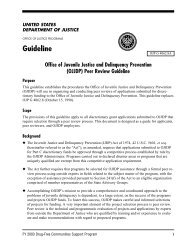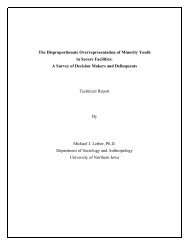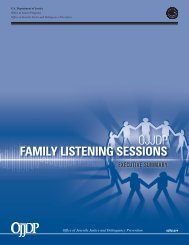Juvenile Court Statistics 2005. - Office of Juvenile Justice and ...
Juvenile Court Statistics 2005. - Office of Juvenile Justice and ...
Juvenile Court Statistics 2005. - Office of Juvenile Justice and ...
- No tags were found...
You also want an ePaper? Increase the reach of your titles
YUMPU automatically turns print PDFs into web optimized ePapers that Google loves.
Chapter 3National Estimates <strong>of</strong>Delinquency Case ProcessingThis chapter quantifies the flow <strong>of</strong>delinquency cases referred to juvenilecourt through the stages <strong>of</strong> thejuvenile court system as follows.Referral: An agency or individualfiles a complaint with court intakethat initiates court processing. Casescan be referred to court intake by anumber <strong>of</strong> sources, including lawenforcement agencies, social serviceagencies, schools, parents, probation<strong>of</strong>ficers, <strong>and</strong> victims.Detention: <strong>Juvenile</strong> courts sometimeshold youth in secure detentionfacilities during court processing toprotect the community, to ensure ajuvenile’s appearance at subsequentcourt hearings, to secure the juvenile’sown safety, or for the purpose<strong>of</strong> evaluating the juvenile. ThisReport describes the use <strong>of</strong> detentionbetween court referral <strong>and</strong> casedisposition only, although juvenilescan be detained by police prior toreferral <strong>and</strong> also by the courts afterdisposition while awaiting placementelsewhere.Intake: Formal processing <strong>of</strong> a caseinvolves the filing <strong>of</strong> a petition thatrequests an adjudicatory or waiverhearing. Informally processed cases,on the other h<strong>and</strong>, are h<strong>and</strong>led withouta petition <strong>and</strong> without an adjudicatoryor waiver hearing.Waiver: One <strong>of</strong> the first decisionsmade at intake is whether a caseshould be processed in the criminal(adult) justice system rather than inthe juvenile court. Most states havemore than one mechanism for transferringcases to criminal court: prosecutorsmay have the authority to filecertain juvenile cases directly incriminal court; state statute mayorder that cases meeting certain age<strong>and</strong> <strong>of</strong>fense criteria be excluded fromjuvenile court jurisdiction <strong>and</strong> fileddirectly in criminal court; <strong>and</strong> a juvenilecourt judge may waive juvenilecourt jurisdiction in certain juvenilecases, thus authorizing a transfer tocriminal court. This Report describesthose cases that were transferred tocriminal court by judicial waiver only.Adjudication: At an adjudicatoryhearing, a youth may be adjudicated(judged) delinquent if the juvenilecourt determines that the youth didcommit the <strong>of</strong>fense(s) charged in thepetition. If the youth is adjudicated,the case proceeds to a dispositionhearing. Alternatively, a case can bedismissed or continued in contemplation<strong>of</strong> dismissal. In these caseswhere the youth is not adjudicateddelinquent, the court can recommendthat the youth take some actionsprior to the final adjudication decision,such as paying restitution orvoluntarily attending drug counseling.<strong>Juvenile</strong> <strong>Court</strong> <strong>Statistics</strong> 2005 29


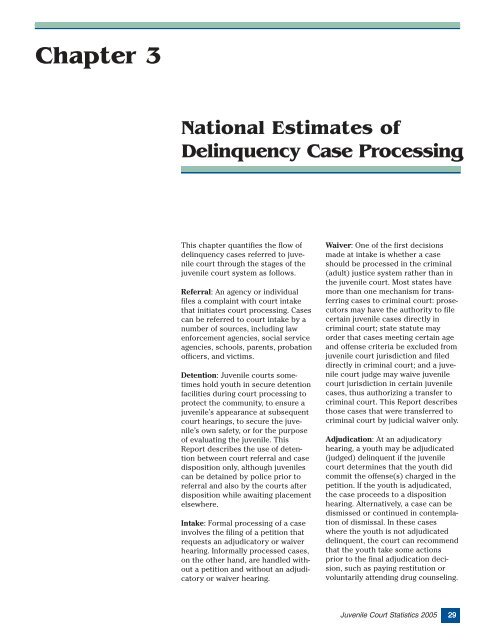
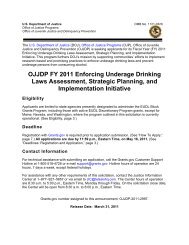

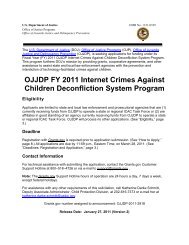
![Chapter 5 [PDF] - Office of Juvenile Justice and Delinquency ...](https://img.yumpu.com/46584340/1/190x245/chapter-5-pdf-office-of-juvenile-justice-and-delinquency-.jpg?quality=85)






